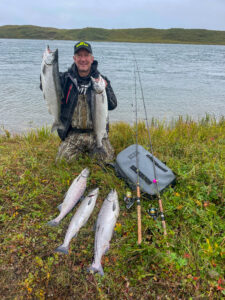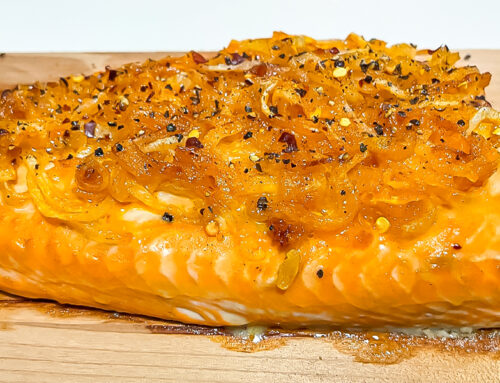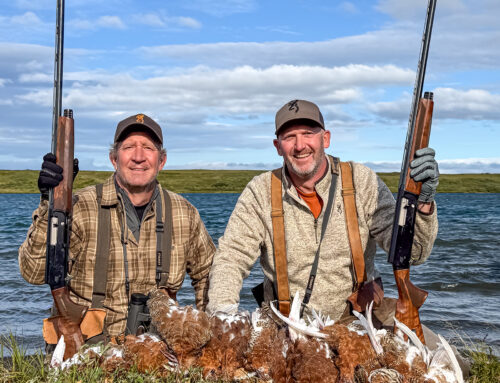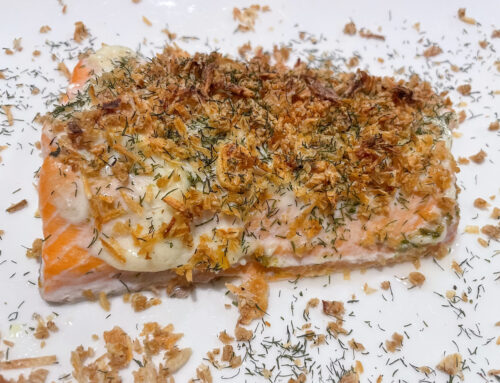We’ve had a number of people ask about the latest article that’s running in the current issue of Salmon, Trout, Steelheader magazine (the Jan. 2023 issue), saying it’s hard to read the pages on their phone. So, here’s the actual article, as written by Scott Haugen:
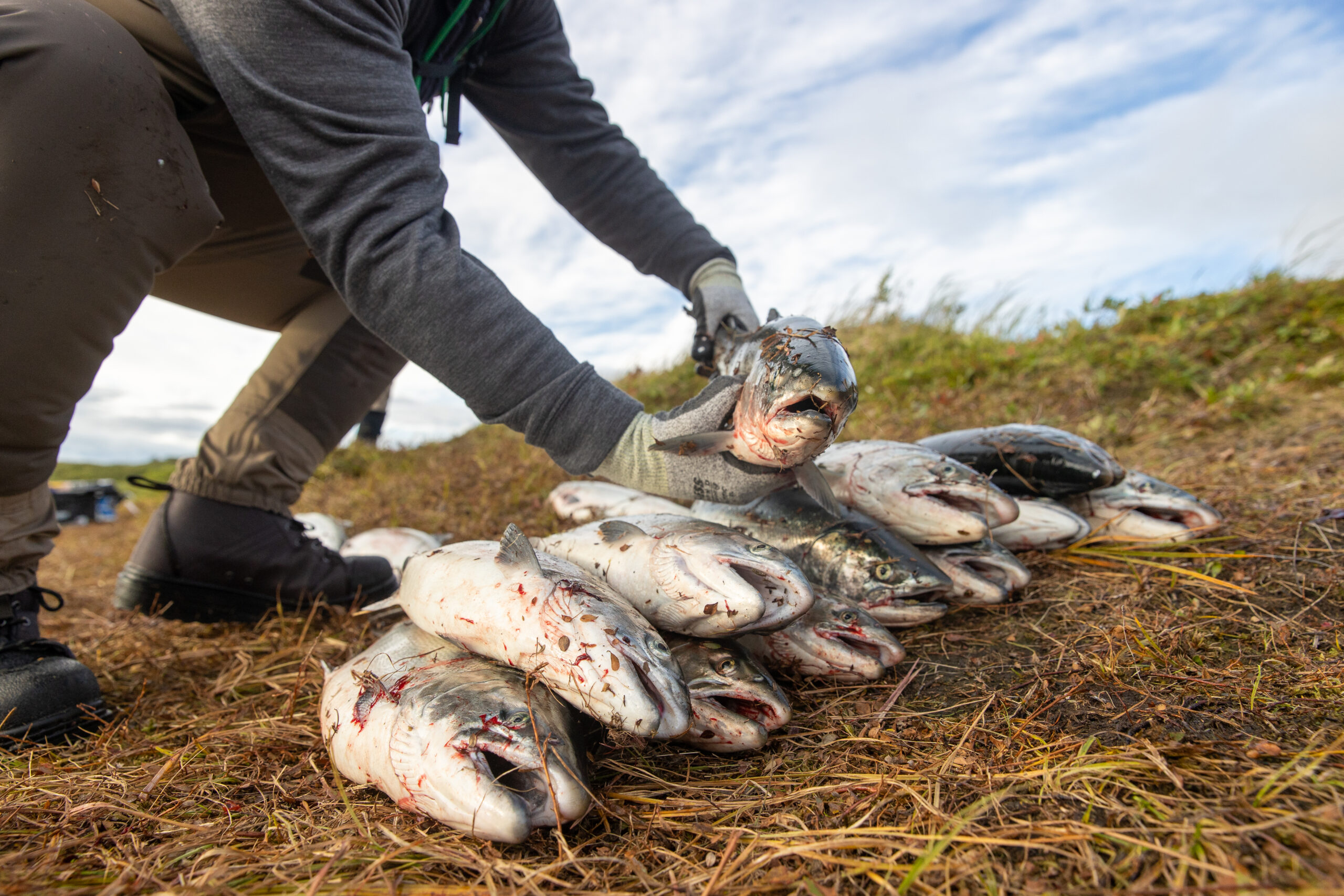
When I arrived in camp, everyone was smiling. It didn’t surprise me. They’d just consumed an impressive lunch and many were working on dessert. There’s always dessert in fish camp.
“What are you going to write about this time?” asked a fellow STS subscriber, referring to our week ahead at Becharof Lodge on Alaska’s Egegik River, a place I’ve been sharing for years in these pages. “I’m not sure,” I smiled, “we’ll just wait and see how things come together.”
After polishing off a hot lunch, I took my dishes to the sink. That’s when Goni, the famed camp cook, pulled me aside. “I know what you can write about,” she offered with enthusiasm. “Write about the people. You always write about the fishing. But think about the people. See that guy over there,” she nodded. “What do you think he does for a living? Or what about that guy…or that couple?”
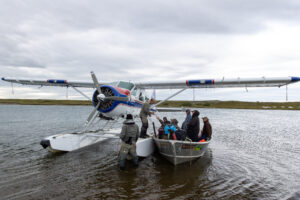 The questions were rhetorical, but Goni kept going. “That guy in the fly vest is a Harvard professor. The one sitting over there, drinking coffee, staring at the river, is a truck driver who saved for years to come fishing here. And that older gentleman, he’s from Alabama and that’s his granddaughter, it’s her first trip to Alaska. There are 12 other people in camp, and they all have a story.” Goni’s words and her optimism got me thinking.
The questions were rhetorical, but Goni kept going. “That guy in the fly vest is a Harvard professor. The one sitting over there, drinking coffee, staring at the river, is a truck driver who saved for years to come fishing here. And that older gentleman, he’s from Alabama and that’s his granddaughter, it’s her first trip to Alaska. There are 12 other people in camp, and they all have a story.” Goni’s words and her optimism got me thinking.
Over the next five days I watched people. I also talked with them. But mostly, I listened. Interestingly, all 16 of the people in camp were there because of stories they’d read in STS over the years, stories I’d written about this special place in remote Alaska.
“I first read about it in 2008,” smiled one gentleman from Idaho. Last year he brought his son fishing and had such a good time, this season he brought his wife and another couple they’d been friends with for years. “I kept that magazine in my Bucket List pile,” the man continued, “along with all the others you’ve written over years on fishing the Egegik River.”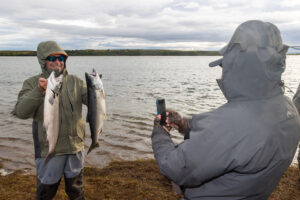
The couples caught limits of coho every morning and they were all a joy to be around. After lunch the wives often stayed back at the lodge, reading, playing games, talking with other guests. The fishing was good, and they loved it, but they really liked socializing and hearing everyone’s stories. The husbands went trekking across the tundra a couple days, ptarmigan hunting. The whole camp enjoyed ptarmigan appetizers that Goni prepared one night.
There was a couple who’d been married 14 years. They were on their honeymoon. “Life got so busy the moment we were married, we never went on a real honeymoon,” shared the wife. The couple owned their own business and were finally at a point in life where they could take that honeymoon. There were mornings they caught their limit of five coho in 15 minutes and were back at the lodge for a late breakfast. They loved catching fish, but they relished their alone time in camp while everyone else was fishing. They appreciated everything about this special place, from the birds to the sunrises to the stunning sunsets, and everything in between
Then there was the group who’d been coming every year since 2008, after reading the first story I ever wrote in STS on fishing the Egegik River. Most of the group of eight were the same year after year, but if one friend couldn’t make it, another friend quickly filled the spot.
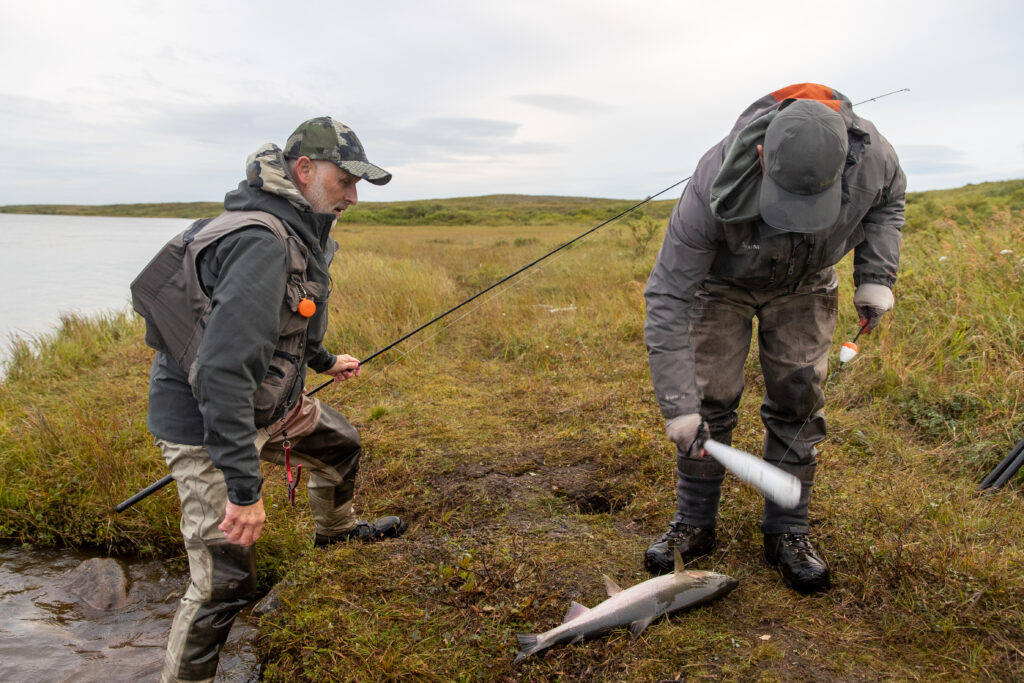 There was the angler who kept to himself. He caught loads of fish. I liked watching him fish, but he was quiet. When I asked his friend about about him, he explained how his son was tragically killed. I’ll spare the details. The man looked forward to this fishing trip every year. It was his escape. His therapy.
There was the angler who kept to himself. He caught loads of fish. I liked watching him fish, but he was quiet. When I asked his friend about about him, he explained how his son was tragically killed. I’ll spare the details. The man looked forward to this fishing trip every year. It was his escape. His therapy.
Once I started talking with people I was shocked by the number who’d lost loved ones. Their best relief from the grief was fishing in remote Alaska.
“That was the best day of fly fishing I’ve ever had,” shared an excited man as he made his way to lunch this past season. “I landed over 20 coho, including a big chum.” He’d fished all over Alaska.
There was another group of fly anglers in camp, too. Four men from Oregon wanted to catch coho multiple ways, including on surface poppers. One man caught a chrome coho on the first cast of his first morning, with a popper. His buddy caught one on a popper a few minutes later, followed by another friend who did the same. Those anglers each had multiple 20+ salmon days, some over 30. All of them also caught each species of salmon that makes their way into the upper stretch of the Egegik River, all but king salmon. They also went on a flyout to a remote stream and caught plenty of beautiful Arctic char.
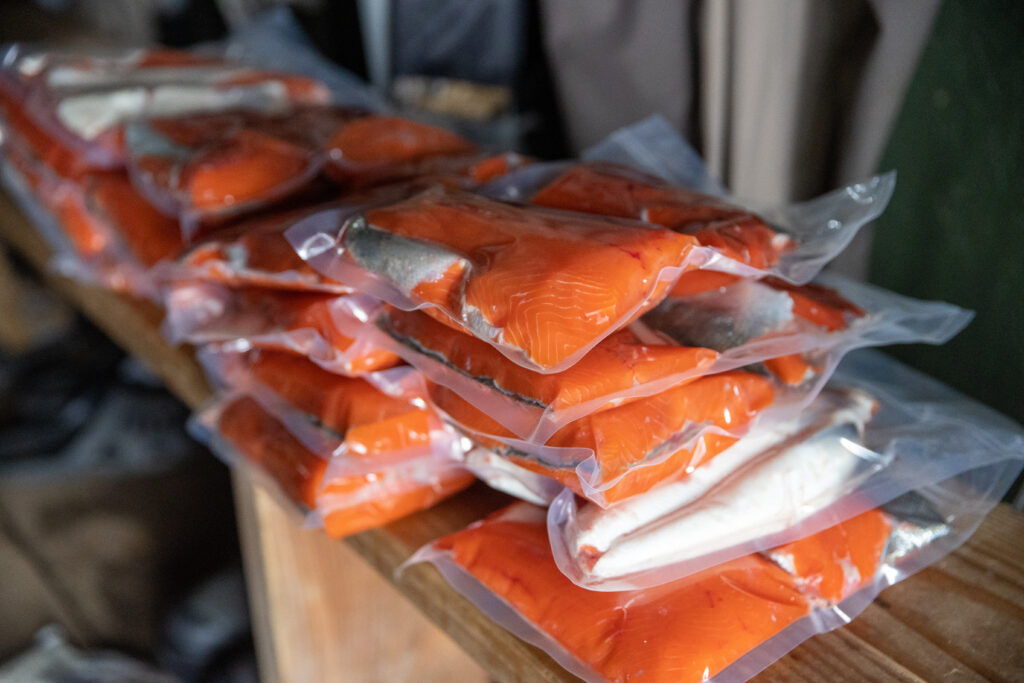 There was a man in camp this past season. It was his second year in a row. He wasn’t supposed to be there. Cancer was supposed to have won by then. The year prior several of his friends pitched in and made his dream of one day fishing in Alaska, a reality. The man had stage 4 cancer. One afternoon when he was fishing, catching coho on every cast, a man walked up to him from behind. It was his best friend. The surprise visit was coordinated by friends and the staff at Becharof Lodge. There wasn’t a dry eye on the river at that day. The man with cancer will be the first to tell you, fishing in Alaska has given him a new lease on life, and iss his motivation to keep going every single day.
There was a man in camp this past season. It was his second year in a row. He wasn’t supposed to be there. Cancer was supposed to have won by then. The year prior several of his friends pitched in and made his dream of one day fishing in Alaska, a reality. The man had stage 4 cancer. One afternoon when he was fishing, catching coho on every cast, a man walked up to him from behind. It was his best friend. The surprise visit was coordinated by friends and the staff at Becharof Lodge. There wasn’t a dry eye on the river at that day. The man with cancer will be the first to tell you, fishing in Alaska has given him a new lease on life, and iss his motivation to keep going every single day.
Last year I quit taking my laptop on trips with me. For the past 21 years I took my laptop everywhere, and once I was done fishing or hunting, promptly got to work. I didn’t converse with people very often because I always had loads of photos to sort and numerous magazine articles to write. It was selfish, but I’d rather spend time getting work done in camp than once home with my family.
Then our sons moved from home and things slowed down a bit for Tiffany and I. When I left my laptop behind, I couldn’t do any work. I felt a huge relief wherever I went. That’s when my eyes were opened to the people. Two years ago when spending two weeks at Becharof Lodge, there was a father and daughter everyone loved. The dad had fished his whole life. It was the first fishing trip ever for his daughter, in her early 20s. She learned to fish and caught loads of coho every day. She loved it, and so many guests were rooting for her.
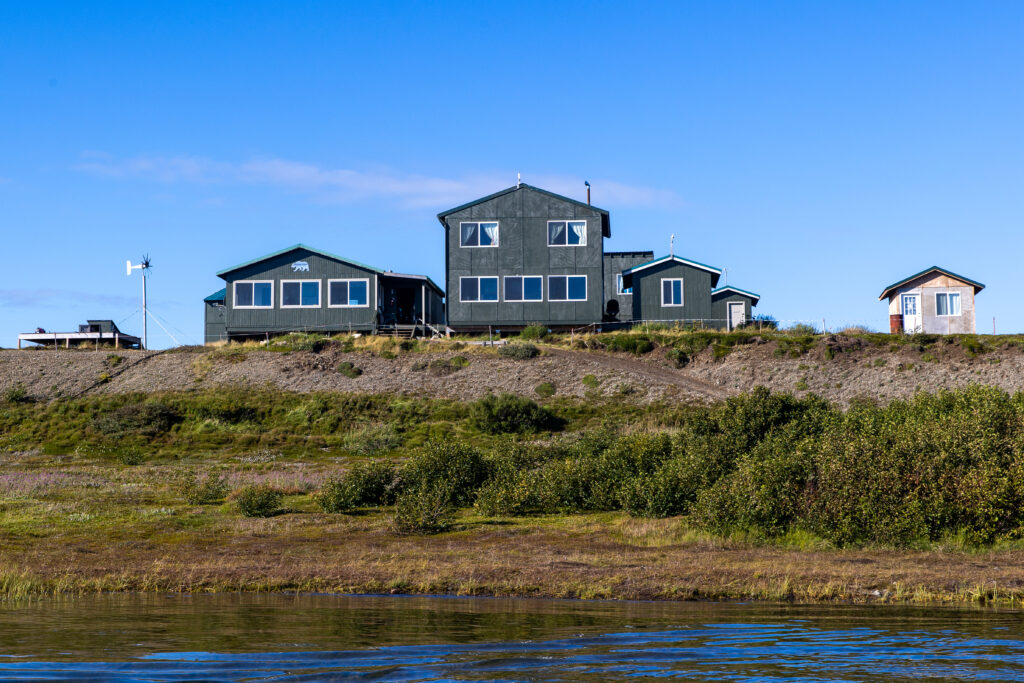
Rarely in fishing camps do you see people competing for the most or biggest fish. Friends will do this in good fun, but rarely will strangers. One morning there was a couple who struggled to catch coho. The fish were there, they were just holding in one narrow slot, which another angler fished. The man caught coho after coho, then offered the hole to the couple. The man poured himself a cup of hot coffee, sat on the grassy shores of the Egegik River and smiled as the husband and wife caught fish on every single cast over the next 90 minutes. They were having the time of their life, and so was the man who sat there and watched. He shot me a wink, as I watched him watch them.
People’s appreciation for the big picture makes me smile. There’s the occasional angler who focuses on fish and only fish. That’s fine, I used to do that, I think we all did. I just hope once they return home, memories of remote Alaska flood their mind. Fishing in remote Alaska is about so much more than catching fish.
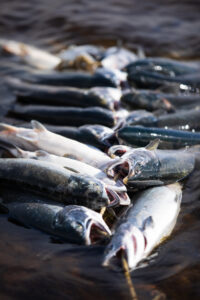 Most people acknowledge when a brown bear shows up on the river. Or a herd of caribou wanders through. Or a gray wolf or red fox passes by camp. Others are quick to note the variety and abundance of bird life on the river and across the tundra. Alaska’s state bird, the willow ptarmigan, has been thriving on the river the past three years. Ptarmigan populations can be cyclical, and they’re at a high right now on this part of the Peninsula. I’m glad. I’ve hunted and photographed these birds throughout the state and I just love hearing their calls echo across the tundra. Many birder lovers make it to camp and love the area for that reason, alone.
Most people acknowledge when a brown bear shows up on the river. Or a herd of caribou wanders through. Or a gray wolf or red fox passes by camp. Others are quick to note the variety and abundance of bird life on the river and across the tundra. Alaska’s state bird, the willow ptarmigan, has been thriving on the river the past three years. Ptarmigan populations can be cyclical, and they’re at a high right now on this part of the Peninsula. I’m glad. I’ve hunted and photographed these birds throughout the state and I just love hearing their calls echo across the tundra. Many birder lovers make it to camp and love the area for that reason, alone.
The past two seasons at Becharof Lodge, the internet and satellite TV have been down. “We’ve tried to get them out to fix the internet, several times,” Mark Korpi, co-owner of Becharof Lodge shared with me. “Don’t do that!” Chimed a man who overheard us talking. “It’s so relaxing not to have internet, and it’s amazing how much everyone is talking to one another because of it,” he smiled. He was right. People were always engaged in conversation and enjoying themselves. Some even booked to come back next year, with strangers they’d just met. Friendships can quickly develop in fish camp.
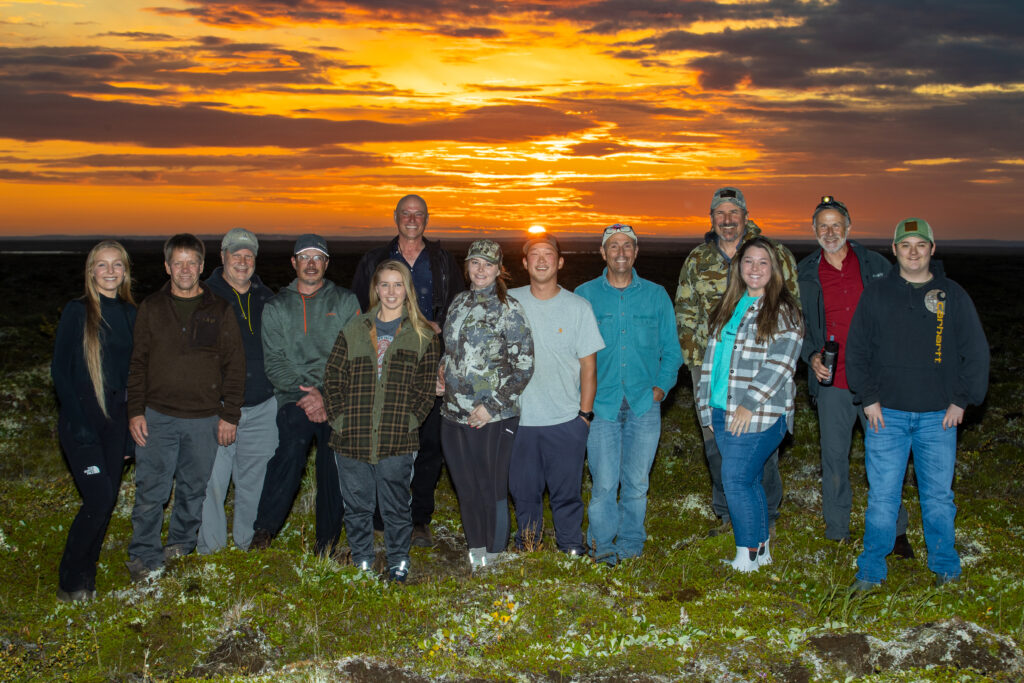
Fishing in remote Alaska is good therapy. Those who have fears of bears and concerns of bugs see them quickly fade once the fishing starts. When watching wildlife, no one cares about checking email or catching the news, they know that’s awaiting them back in civilization. And that return home always comes too soon.
